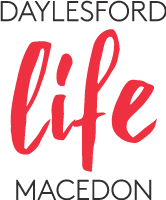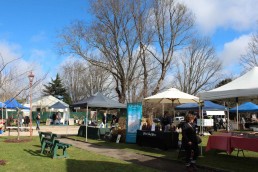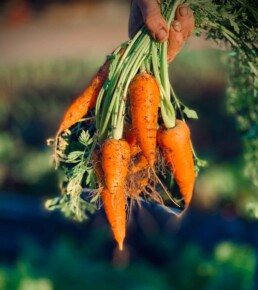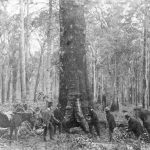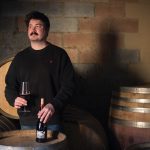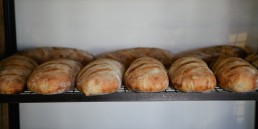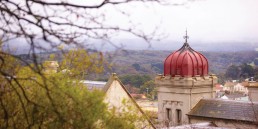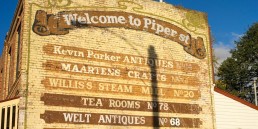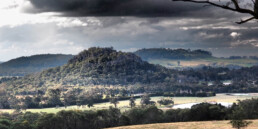George Wicker planted his first potatoes as a teenage boy. One spring, he was given a sack of red Pontiac potatoes by his uncle. He took a spade, turned over the rich deep soil on the roadside outside his family’s farm in Little Hampton, near Trentham.
That autumn, he pulled up the potatoes and sold them by the side of the road. That was over 50 years ago. He has not missed a potato season since then. In fact, there has been a Wicker growing potatoes in the deep, chocolate brown soil around Trentham since the gold rush days. Back then, the country was covered in towering forest, before it was cleared for timber for the gold mines, revealing the fertile soil below. Those potatoes fed the miners who powered the most affluent gold boom in global history.
You can see the deep brown ploughed potato fields in spring and early summer. Later on, the deep green, waist-high plants grow in rows across the rolling hills. Come autumn, the potato plants die off, and the harvesters dig the potatoes up from the ground. Soon after the roadside stalls pop up, little sheds with an honesty box where visitors can buy a bag of freshly dug spuds for just a few bucks. While there are not as many potato farmers as there were in the heydays of the early 20th century, there are still half a dozen farmers in the area. They grow boutique varieties to supply local restaurants, stores, farmers’ markets, and roadside stalls.
In late autumn, the region’s spud culture, history, lore, and culinary legacy is to be celebrated on Saturday, May 2, at the 13th annual Great Trentham Spudfest. This day-long festival spreads across the whole town, in four precincts, offering a wide variety of things to do and see, taste and buy. Here, spud farmers will sell over 24 different varieties of potato, some pulled from the earth the night before the festival. “If you have never had a new season’s potato, straight from the soil, you are missing out on something special,” says George. Food trucks will be serving potato-based dishes such as roast spuds, roesti, patatas bravas, potato scones, potato cakes, mash with sausages, potato and leek soup with RedBeard Historic Bakery potato bread and the famous Trentham CFA Chips. What sets this festival apart, is the bus tours arranged by the local historical society, touring the old sheds that dot the landscape, built to house the seasonal potato diggers. Often WWI veterans seeking out a living in the bush, they’d roam the district, living on basic provisions and harvesting spuds. George Wicker will be there selling his Kennebec, Nicola, King Edward, Sebago and locally bred Coliban potatoes at Spudfest. “When you’re in the area, you have to try our spuds,” he says with a warm smile. “The cool climate kills the bugs in the soil, and the rich earth makes them taste like nothing else.” You can find his roadside stand selling excellent spuds from late summer to spring under a giant old gum tree near 1780 Daylesford – Trentham Road.
Photography by Richard Cornish
About the author

Richard Cornish
Richard Cornish is an award winning food writer whose love of the land lead him to explore the issues around food, where it comes from, how it gets to us and why some foods taste better than others. He writes for The Age, SMH, DMT Life and has written eight cook books including co-writing the Movida series with Frank Camorra.
- Richard Cornishhttps://daylesfordmacedonlife.com.au/author/richard-cornish/November 20, 2018
- Richard Cornishhttps://daylesfordmacedonlife.com.au/author/richard-cornish/February 20, 2019
- Richard Cornishhttps://daylesfordmacedonlife.com.au/author/richard-cornish/August 25, 2019
Share this article
While You're Here
Starting with Sourdough
Sourdough is bread made with a traditional wild yeast leaven. This is the way it has been done for…
Follow the Sparkling Trail
Not all sparkling wine is created equal. The production of a truly great sparkling wine can only…
Convent Daylesford: Feast Your Senses
Perched on the slopes of Wombat Hill is The Convent Gallery, Daylesford. Overlooking the township…
Shopping for that special something?
Stroll down the historic blue-stone-paved Piper Street of Kyneton and fill a basket with locally…
What’s New in the Daylesford Macedon Ranges: Autumn 2021
I don’t know where the saying ‘bounced back’ first originated, but it’s a term we now claim as our…
Top 10 Things To Do When You Next Visit
We asked, and you voted. Here are the top 10 things to do in our region. It’s a great mix of…
Health & Wellness,Eat & Drink,History & Culture,Outdoor Experiences
